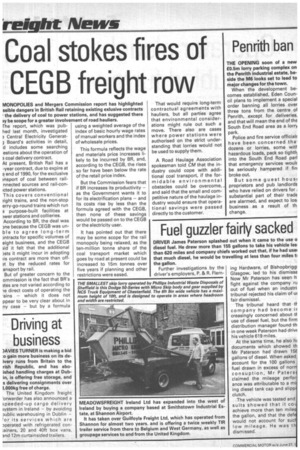Coal stokes fires of CEGB freight row
Page 18

If you've noticed an error in this article please click here to report it so we can fix it.
MONOPOLIES and Mergers Commission report has highlighted ssible dangers in British Rail retaining existing exlusive contracts the delivery of coal to power stations, and has suggested there iy be scope for a greater involvement of road hauliers.
At present, British Rail has a -year contract, due to expire at a end of 1990, for the exclusive Insport of coal between railnnected sources and rail-con:cted power stations.
This covers conventional ight trains, and the non-stop erry-go-round trains which run a purpose-built facilities at awer stations and collieries. According to BR, the deal was )ne because the CEGB was u nble to agree long-term )ntracts for specific volumes of eight business, and the CEGB iid it felt that the additional )sts it might incur in adopting is contract are more than off3t by the reduced rates for ansport by rail.
But of greater concern to the ommission is the fact that BR's )tes are not varied according to le direct costs of operating the • ains — which it does not ppear to be very clear about in ny case — but by a formula index of basic hourly wage rates of manual workers and the index of wholesale prices.
This formula reflects the wage and materials price increases likely to be incurred by BR, and, according to the CEGB, the rises . so far have been below the rate of the retail price index.
But the Commission fears that if BR increases its productivity — as the Government wants it to for its electrification plans — and its costs rise by less than the formula agreed with the CEGB, then none of these savings would be passed on to the CEGB or the electricity user.
It has pointed out that there may be some scope for the rail monopoly being relaxed, as the ten-million tonne share of the coal transport market which goes by road at present could be increased to 15m tonnes over five years if planning and other restrictions were eased. That would require long-term contractual agreements with hauliers, but all parties agree that environmental considerations might rule out such a move. There also are cases where power stations were authorised on the strict understanding that lorries would not be used to supply them.
A Road Haulage Association spokesman told CM that the industry could cope with additional coal transport, if the formidable environmental obstacles could be overcome„ and said that the small and competitive nature of the haulage industry would ensure that operational savings were passed directly to the customer.




















































































































